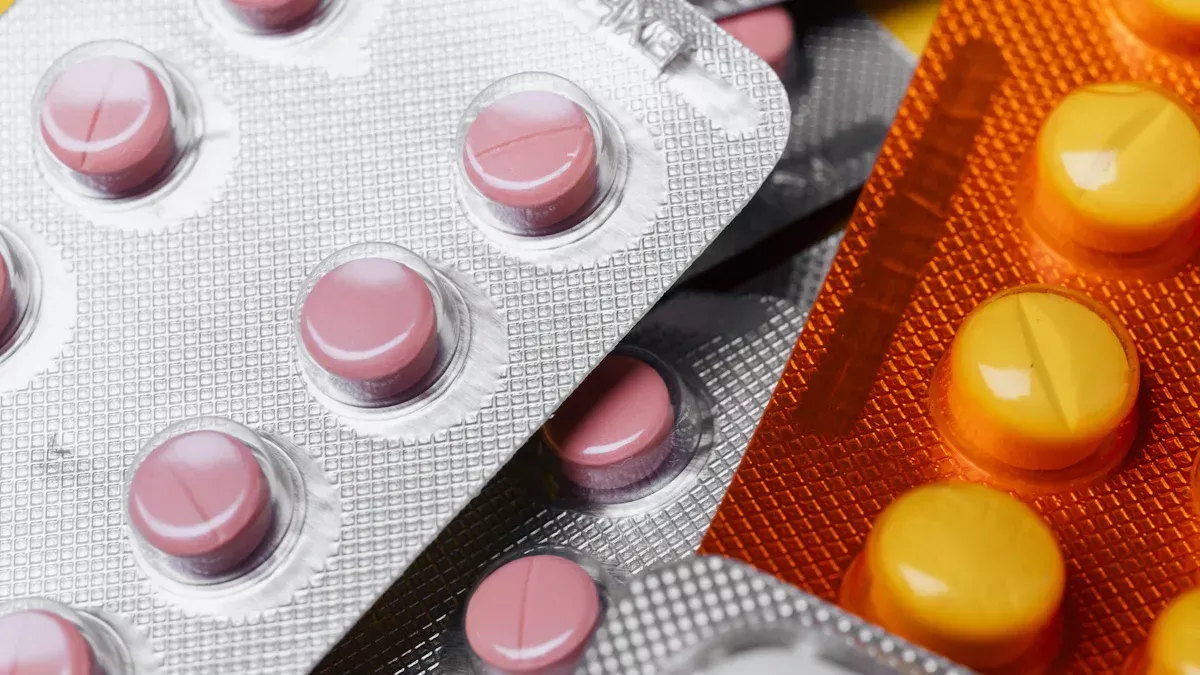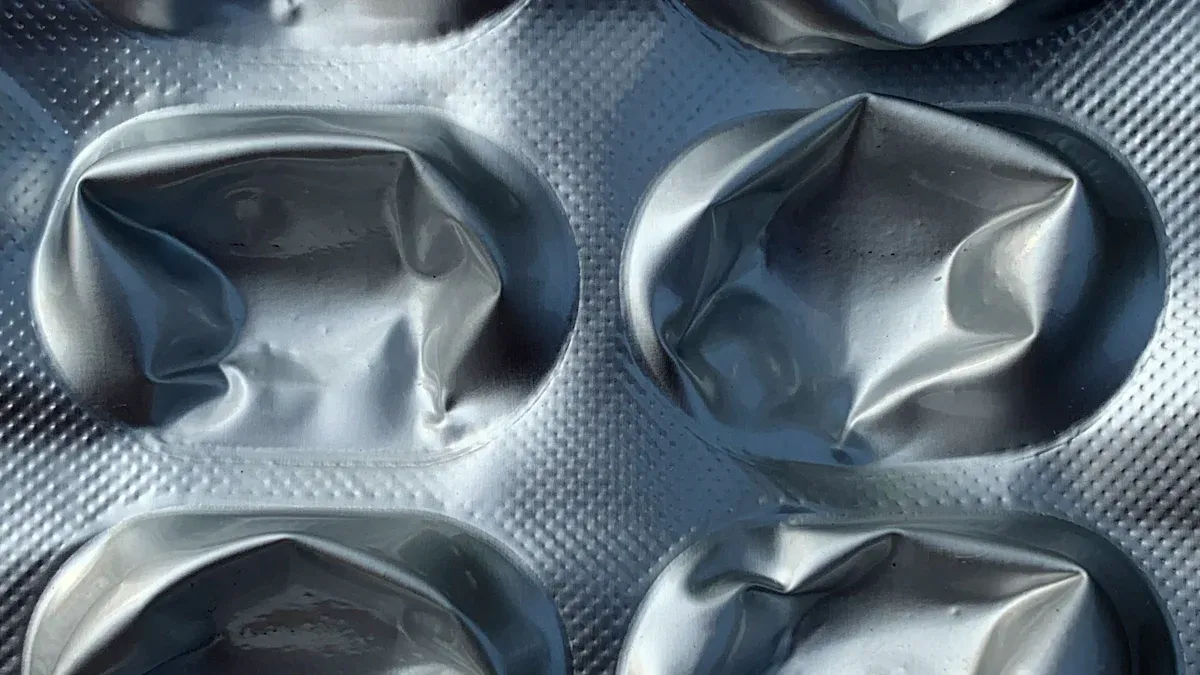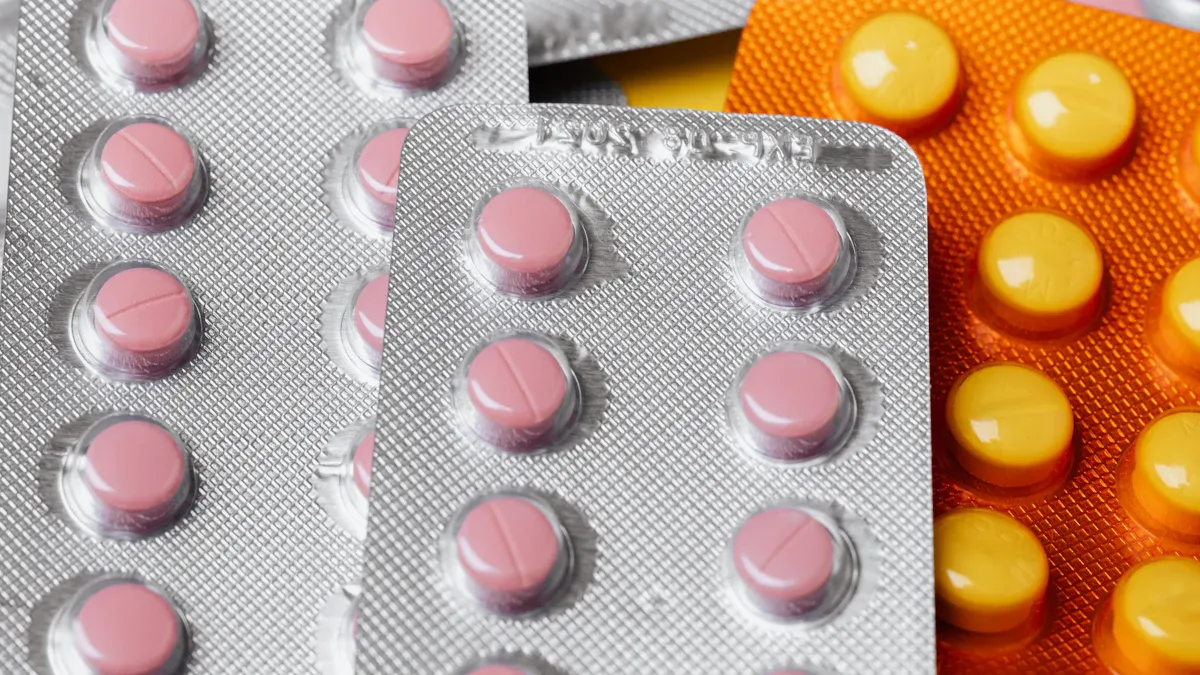Views: 0 Author: Site Editor Publish Time: 2025-09-16 Origin: Site









You can see the main difference in the materials used. Alu-alu packaging uses aluminum on both sides. This gives your medicine better protection from light, moisture, and air. This is important for drugs that are very sensitive. You may also think about cost. The type of packaging changes the price and how safe your medicine is. Check the table below to help you choose based on drug sensitivity and cost:
Factor | Alu-Alu | Aluminium Strip |
|---|---|---|
Drug Sensitivity | High | Moderate |
Cost Sensitivity | Less suitable | Highly suitable |
Alu-alu packaging protects sensitive medicines very well. It uses aluminum on both sides. This blocks light, moisture, and air.
Blister packaging is used more often. It lets you see the pills inside. This helps users keep track of their medicine.
Think about the cost. Alu-alu packaging costs about 50% more than blister packaging. But it keeps medicine safe for longer and protects it better.
Pick packaging based on how sensitive the product is. Use alu-alu for expensive or sensitive drugs. Use blister packaging for regular medicines.
Both types of packaging are hard to recycle. Check your local rules for how to throw them away. Think about how they affect the environment.

Alu-alu packaging is used for medicines that need strong protection. It has aluminum foil on both sides. You cannot see through this packaging. Alu-alu keeps out light, moisture, and air. Many companies pick alu-alu for drugs that spoil fast. You can find alu-alu in lots of medicine packages.
Alu-alu packaging is made with a special process. Here are the steps:
Cold forming: Aluminum foil is pressed into a mold. No heat is used.
Product filling: Tablets or capsules go into the pockets.
Sealing: Another layer of aluminum foil seals the package.
Cutting and perforation: Packs are cut and lines are added to break off single doses.
This process makes a strong and safe package for your medicine.
Alu-alu packaging has many important features. The table below shows how alu-alu compares to other types:
Feature | Alu-Alu Packaging | Alu-PVC Packaging |
|---|---|---|
Material | Aluminum foil both sides | Plastic with aluminum back |
Protection | High barrier | Moderate barrier |
Shelf Life | Longer | Shorter |
Transparency | Opaque | See-through |
Cost | Higher | Lower |
Environmental | More recyclable | Less eco-friendly |
Alu-alu gives better protection and a longer shelf life.
Alu-alu has many good points, but there are some downsides too.
Advantages | Disadvantages |
|---|---|
Lightweight and durable | Uses more energy to make |
Excellent barrier properties | Limited supply |
Highly recyclable | Higher transport emissions |
Versatile |
Tip: Pick alu-alu packaging when you want the best protection for sensitive medicines. It may cost more, but it helps keep your medicine safe.

Blister packaging is common in stores and pharmacies. It uses clear plastic to make small pockets for each pill. Aluminum foil or paperboard seals the pills inside. You can push the pill out through the foil when needed. Blister packaging lets you see your medicine. Each dose stays separate from the others. Many people like this packaging because it is simple to use. It also helps you keep track of your pills.
Manufacturers follow several steps to make blister packaging:
Blister Forming: Machines heat plastic sheets and shape them into pockets.
Product Loading: Tablets or capsules drop into each pocket.
Sealing: The machine seals the pockets with a backing using heat and pressure.
Coding and Traceability: Important details are printed on the backing.
Perforation and Cutting: The sheet is cut into packs, and lines are added to break off single doses.
This process keeps each pill safe. It also makes it easy to take the right amount.
Blister packaging is different from other types. The table below shows the main parts:
Component | Description |
|---|---|
Forming Film | Makes pockets for pills; materials include PVC, PVDC, PCTFE, polypropylene, and multi-layer laminates. |
Lidding | Covers the pills and shows tamper-evidence; types include Push-Through Packs, peelable lids, and hybrids. |
Heat-Seal Coating | Sticks the film and lidding together; keeps the seal tight and safe using special polymer resins. |
Blister packs protect medicine from moisture, light, and air. Each pocket gives you the right dose every time. The clear plastic lets you see the pills. This helps people trust the product and brand.
Blister packaging has many good points and some downsides. Here is a quick look:
Advantages of Blister Packaging | Description |
|---|---|
Superior Barrier Protection | Keeps out moisture, oxygen, and light to keep drugs strong. |
Precise Dose Accuracy & Traceability | Helps prevent mistakes and makes tracking easier. |
Improved Patient Adherence | Makes it easier to take medicine as directed, helping people follow instructions. |
Tamper-Evident and Secure | Shows if someone has opened the pack, which builds trust. |
Ideal for Clinical Trials | Keeps doses the same and allows for small batches. |
Lower Cross-Contamination Risk | Each pill is sealed, so there is less chance of contamination. |
Disadvantages of Blister Packaging | Description |
|---|---|
Increased Packaging Waste | Hard to recycle because it uses different materials. |
Opaque Packaging Limits Visibility | If the pack is not clear, it can be confusing. |
Expensive Tooling for Custom Shapes | Making special shapes costs more money. |
Slower Production for Cold-Form Lines | Making these packs can take more time. |
Note: Blister packaging works well for most medicines. Alu-alu packaging gives even better protection for very sensitive drugs. Think about what kind of medicine you have and how much protection it needs before you choose a packaging style.
There is a big difference in what each packaging uses. Alu-alu blister packaging has aluminum foil on both sides. This makes a strong barrier. It keeps out light, water, and air. Blister packaging uses plastic on one side and aluminum on the other. The plastic is usually PVC. The table below shows how these materials are different:
Feature | Alu-Alu Blister Packaging | Blister Packaging (Alu-PVC) |
|---|---|---|
Material Composition | Aluminum foil on both sides | One side aluminum, one side plastic |
Transparency | Opaque | Transparent (plastic side) |
Flexibility | Less flexible | More flexible |
Recyclability | High | Lower |
Alu-alu blister packaging gives better protection because of two aluminum layers. Regular blister packaging lets you see the product but does not protect as well.
Barrier protection is very important when picking packaging. Alu-alu blister packaging keeps out water, air, and light. This helps keep medicine safe, even if it is sensitive. Blister packaging with plastic only gives some protection. It works for products that do not need as much care.
Feature | Alu-Alu Blister Packaging | Blister Packaging (Alu-PVC) |
|---|---|---|
Moisture Barrier | 100% protection | Partial protection |
Light Protection | Complete | Partial |
Oxygen Barrier | Excellent | Good |
If your product needs the most protection, alu-alu blister packaging is best.
Cost is a big thing to think about. Alu-alu blister packaging costs more than regular blister packaging. This is because it uses more aluminum and is harder to make. On average, alu-alu packaging is about 50% more expensive. The table below shows why:
Packaging Type | Average Cost | Contributing Factors |
|---|---|---|
Alu-Alu Blister Packaging | Higher | Double aluminum, advanced design, complex manufacturing |
Blister Packaging | Lower | Cheaper plastic, simple production |
Alu-alu blister packaging costs about 50% more than regular blisters.
You should think about if the extra cost is worth the better protection.
The size of the packaging changes how much space you need. Alu-alu blister packaging is bigger because the aluminum makes larger pockets. Blister packaging with plastic has smaller pockets. This saves space.
Alu-alu blister packaging: Bigger size, less flexible, takes up more space.
Blister packaging: Smaller size, more flexible, fits in small boxes.
If you want smaller packaging, blister packaging with plastic may be better.
Shelf life is important, especially for medicines that spoil fast. Alu-alu blister packaging can make shelf life 50-100% longer than regular blister packaging. The double aluminum keeps out almost all water and air. This means your product stays good for longer.
Alu-alu blister packaging lets in less than 0.001 grams of water per square meter each day.
Blister packaging does not protect as well, so shelf life is shorter for sensitive products.
You need to pick packaging that fits your product. Alu-alu blister packaging is best for medicines that are sensitive to light and water. These are drugs that break down fast when they touch air, water, or sunlight. Blister packaging with plastic is good for common medicines that do not need as much protection.
Packaging Type | Best For | Not Suitable For |
|---|---|---|
Alu-Alu Blister Packaging | Light-sensitive, hygroscopic, high-value products | Products where cost is the main concern |
Blister Packaging | Common medicines (e.g., paracetamol), vitamins | Light-sensitive or highly sensitive drugs |
Alu-alu blister packaging is easy to use. You can push pills out or peel off the back. This helps older people and those with weak hands. Blister packaging is smaller but can be harder to open for some people.
When picking packaging, you need to think about a few things. Every product is different, so the packaging should fit its needs. Here are some main points:
Product sensitivity: If your product reacts to light, moisture, or air, alu-alu packaging protects it best. If your product is not very sensitive, blister packaging is fine.
Regulatory requirements: Some places have strict packaging rules. You need to check if your product needs things like tamper evidence or child resistance. Both packaging types must be safe and good for the environment.
Cost considerations: Alu-alu packaging costs more money. If your product does not need extra protection, blister packaging can save you money.
Recyclability: Both alu-alu and blister packaging are tough to recycle. Their mixed materials make recycling hard. Think about how your packaging affects the planet.
Tip: Always look up the newest rules in your country. Rules can change, and new materials might help you meet safety and eco-friendly goals.
Real-life examples can help you pick the right packaging. Check the table below to see how each type works for different needs:
Feature | Alu-Alu Packaging | Blister Packaging |
|---|---|---|
Barrier Properties | Excellent | Good |
Shelf Life Extension | Yes | Sometimes |
Tamper Evidence | Yes | Yes |
Compliance with Standards | High | High |
Here are some cases:
Your product breaks down fast when it touches air. Use alu-alu packaging to keep it safe.
Your product is a vitamin that does not spoil quickly. Blister packaging is good and saves money.
You need strong child-resistance. Blister packaging gives good tamper evidence and meets safety rules.
You want better recycling. Both types are hard to recycle, but new designs could help soon.
Remember: Always pick packaging that fits your product, your budget, and the rules where you sell it.
Alu-alu packaging keeps sensitive medicines safe from harm. Blister packaging is good for most regular drugs. When you pick packaging, think about safety first. Make sure the packaging is tough and lasts long. It should fit your medicine well.
Safety is the most important thing. Choose materials that stop contamination and tampering.
Try to use packaging that is better for the planet. This helps cut down on waste.
Look for ways to save money, like buying in bulk.
Alu-alu packaging costs more because it uses aluminum on both sides. Special machines are needed to make it. This type gives better protection for your medicine. The price is about 50% higher than regular blister packs.
Alu-alu packaging is easier to recycle since it is only aluminum. Blister packaging has both plastic and aluminum mixed together. Most recycling centers cannot handle this mix. Always check your local recycling rules before throwing away packaging.
Blister packaging with plastic is usually easier to open. You can push the pill out through the foil. Alu-alu packs need more force to open. People with weak hands may find alu-alu packs harder to use.
Blister packaging with clear plastic lets light reach the medicine. This can make light-sensitive drugs weaker. Alu-alu packaging blocks all light. It works better for medicines that need protection from sunlight.
Think about how sensitive your product is, the cost, and shelf life. If your medicine needs strong protection, choose alu-alu packaging. For common drugs, blister packaging saves money and works well. Always check safety and local rules before you decide.
Copyright © 2023 Foshan Xingle Machinery Equipment Co.,Ltd. 粤ICP备2023093194号 All rights reserved. Privacy Policy | Sitemap | Support By Leadong